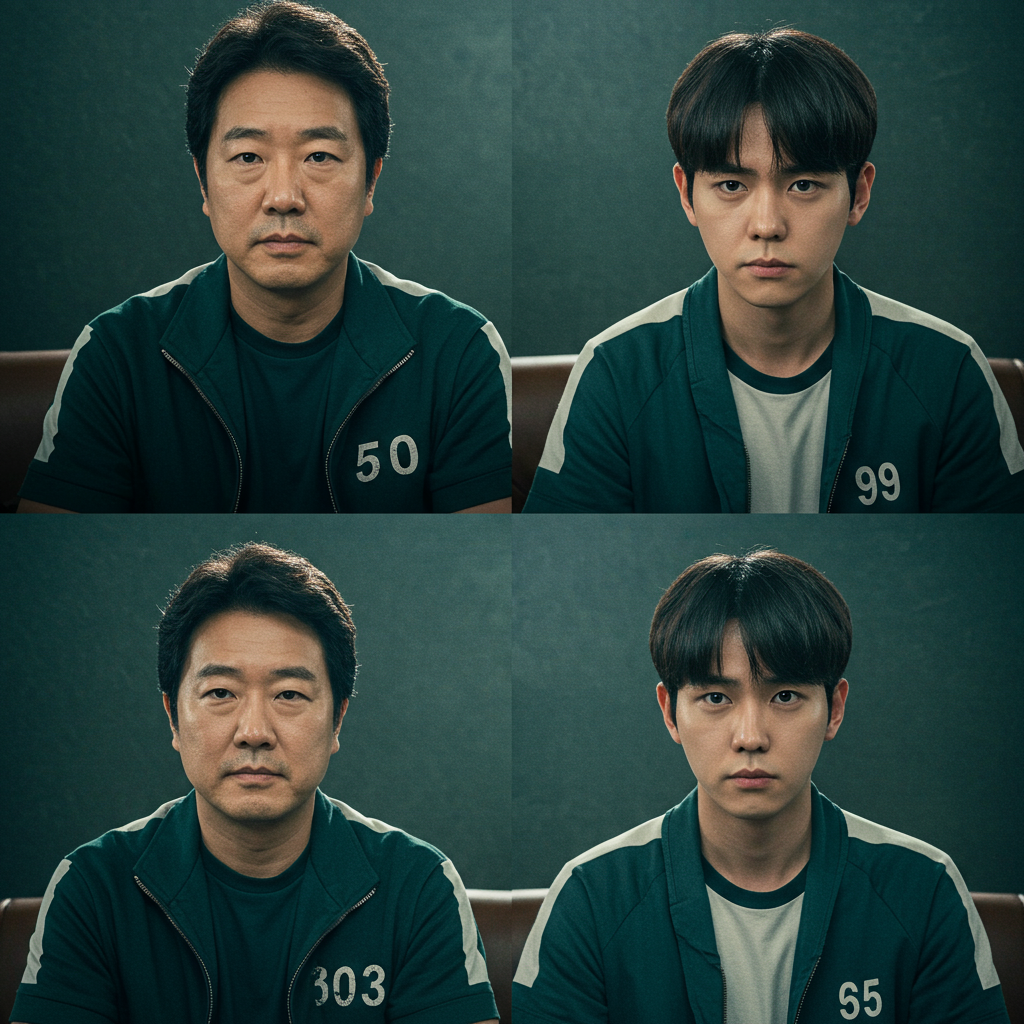Netflix’s global sensation squid Game concluded its central storyline with the release of its third and reportedly final season for creator Hwang Dong-hyuk. Dropping all six episodes on June 27, 2025, the season aimed to provide answers and a definitive end to the harrowing journey of protagonist Seong gi-hun. However, critical reception proved to be as divided as the players themselves, with some praising its powerful, albeit devastating, conclusion while others found the repetitive structure and relentless brutality wearing thin. This final chapter picks up directly after the shocking events of Season 2, thrusting surviving players, including the battered Gi-hun, back into the deadly arena for one last chance at escape or fortune.
The Final Game Begins: Aftermath and Return
Season 3 plunges viewers back into the immediate aftermath of the failed rebellion that closed Season 2. The island remains, the pink-suited guards are still in control, and the surviving players must once again face a new series of lethal children’s games. Seong Gi-hun, Player 456 and the winner of the first game, finds himself involuntarily returned to the competition. Initially depicted as broken and despondent after his previous failures, Gi-hun is forced to navigate a room filled with roughly sixty remaining contestants.
This new crop of players includes a mix of desperate individuals, some of whom quickly prove to be as ruthless as the games require. While Season 1 showcased a spectrum of humanity, reviewers noted that Season 3 leans heavily into depicting players as inherently awful under pressure. However, amidst the increasing cynicism, a few characters emerge as potential exceptions, testing Gi-hun’s wavering faith in human goodness. The season introduces new deadly challenges, including “Hide and Seek,” “Jump Rope,” and the climactic “Sky Squid Game.”
A World of Brutality and Desperation
At its core, Squid Game has always functioned as a brutal allegory for the harsh realities of modern capitalism. The third season doubles down on this theme, presenting the games as a bloodsport where the ultra-wealthy elite watch and wager on the suffering of the debt-ridden and desperate. Reviewers consistently highlighted this critique, noting the show’s “righteous fury” at societal inequalities. The boundless greed of the wealthy VIPs, who even begin participating in the games themselves, underscores the show’s damning message about the corrupting influence of extreme wealth and power.
The central conflict also revolves around the nature of humanity itself. The Front Man, Gi-hun’s ideological adversary, believes people are fundamentally bad and will betray one another when faced with the ultimate pressure of death or immense wealth. Gi-hun, despite his trauma, clings to the hope that goodness can persist. The new games constantly force players into kill-or-be-killed scenarios, serving as cruel tests of trust and morality. This existential battle between cynicism and fragile hope forms the dramatic backbone of the season.
Gi-hun’s Evolving Journey
A significant focus of Season 3 is the transformation of Seong Gi-hun, brought to life once again by Lee Jung-jae’s lauded performance. Having survived the first games and attempted to dismantle them from the outside in Season 2, Gi-hun begins this season haunted by his failures and deeply distrustful of others. Yet, a pivotal moment involving a vulnerable infant unexpectedly reignites his purpose. Several reviews pointed to the introduction of a baby as a key twist that significantly raises the stakes and shifts Gi-hun’s focus from merely surviving or escaping to actively protecting innocence.
Gi-hun’s arc sees him evolve from the seemingly lucky everyman of Season 1 into a figure described by some as operating with “ruthless efficiency.” While maintaining a “well-earned moral code,” he becomes a formidable presence among the other players, almost taking on a mythical quality. His conflict with the Front Man crystallizes the show’s thematic debate: are humans inherently good but corrupted, or simply waiting for an excuse to be awful? Gi-hun’s journey through the final games is a testament to his struggle to retain his humanity in a dehumanizing system.
The Challenges and Spectacle
Season 3 introduces three new primary games designed to be both creative and cruel. While the specific mechanics remain under wraps due to spoiler embargoes, reviews mentioned challenges like “Hide and Seek,” “Jump Rope” (described as particularly “nerve-shredding” by one critic), and the concluding “Sky Squid Game.” The show maintains its signature visual flair, featuring striking production design, though some reviewers felt the spectacle of the new games, particularly the final one, didn’t quite reach the same heights as those in the first two seasons, sometimes appearing overly simplified or digitized.
Despite the visual spectacle, some critics found the repetitive structure of “play a game, people die, repeat” to be less engaging than the initial novelty of Season 1. The show’s consistent adherence to the game format, while core to its identity, led some to feel that the narrative was “going through the motions,” perhaps reflecting the creator’s initial hesitation to produce additional seasons after the unexpected global phenomenon of the first.
Critics Weigh In: A Mixed Verdict
The final season of Squid Game garnered a range of reactions from television critics. While some lauded it as a successful and compelling conclusion to Hwang Dong-hyuk’s narrative arc, others felt it was an underwhelming extension of the story that lost some of its original sharpness. Praise was often directed at Lee Jung-jae’s nuanced portrayal of Gi-hun and the continued strength of the ensemble cast, which included notable returning or elevated characters like Player 222 Kim Jun-hee and Player 120 Cho Hyun-ju. The show’s unflinching commitment to its core critique of wealth inequality was also seen by some as a strength, giving weight to the often relentless brutality.
However, significant criticisms were also raised. Many reviewers found the pacing uneven, suggesting that Seasons 2 and 3 could have been condensed into a tighter single season. The recurring segments where players vote on whether to continue the games were seen as less interesting than the games themselves, and certain side plots, like the ongoing investigation by Detective Hwang Jun-ho, were described as feeling “lifeless” or receiving too much screen time. The dialogue and portrayal of the wealthy VIP spectators were frequently singled out as weak points, with one review calling them “inexcusable” and feeling like they belonged in a different, inferior show. The increase in sheer brutality, without the same level of satirical bite as Season 1, led some to describe the season as a “relentless grind.”
Pacing, Structure, and Side Stories
Debate exists among reviewers on whether Season 3 feels like a true standalone season or more like the concluding half of a larger Season 2. Structurally, it mirrors the original season in many ways, returning Gi-hun to the game island while a separate investigation occurs off-site. This adherence to formula was seen by some as a deliberate choice by Hwang Dong-hyuk to give the audience “what they want” (more games) while reinforcing his message, but others felt it contributed to a sense of repetition.
The narrative choices surrounding elements like the player votes – which return despite the illogic of surviving players choosing to stay after witnessing horrific violence – were noted as plot devices necessary to continue the story but lacking narrative strength. Similarly, Detective Jun-ho’s search for the island, a subplot carried over from previous seasons, was criticized for feeling less substantive and distracting from the central drama within the games. One particularly debated point among critics was the introduction of a new player forced to join the games, a twist some found stretched credibility beyond the show’s established parameters.
The Definitive, Devastating End
Despite mixed reviews on its execution, there is general agreement that Squid Game Season 3 provides a definitive, albeit devastating, conclusion to Seong Gi-hun’s story. The final game, the “Sky Squid Game,” serves as the stage for a dramatic confrontation and resolution. While adhering to spoiler restrictions, reviews indicate that Gi-hun does not survive the final round. In a powerful act of sacrifice, he chooses his fate to ensure the survival and victory of the vulnerable infant introduced earlier in the season. This self-sacrifice is seen by many as a culmination of Gi-hun’s journey, cementing his moral code even in the face of overwhelming evil.
The ending is described variously as impactful, operatic, devastating, and for one critic, so surprising it “entirely beggars belief.” Regardless of interpretation, it marks the definitive end of this chapter for the main protagonist. However, the final moments of the series finale, titled “Humans Are…,” make it clear that while Gi-hun’s story concludes, the games themselves are far from over.
Beyond the Island: What Comes Next?
The very last scene of the season provides a clear setup for the future of the Squid Game franchise. The Front Man is shown observing a recruitment game far from the island, specifically in Los Angeles. This, combined with the introduction of a new recruiter character (reportedly played by Cate Blanchett), strongly hints at the global expansion of the Squid Games, potentially into the Western world.
Creator Hwang Dong-hyuk has stated that Season 3 concludes the specific story he began, but Netflix has clear plans for “franchisification,” including announced spinoffs. This final scene confirms that while the narrative arc of Seong Gi-hun has reached its tragic end, the universe of Squid Game is poised to continue, exploring the reach and nature of the deadly games on a wider scale.
Frequently Asked Questions
What happens to Gi-hun in Squid Game Season 3?
In the third season of Squid Game, protagonist Seong Gi-hun is forced back into the games after the failed rebellion. He navigates new deadly challenges and finds a renewed purpose in protecting a vulnerable infant player. Ultimately, Gi-hun does not survive the final round of the games, choosing to sacrifice himself in the “Sky Squid Game” to ensure the child is declared the winner, bringing a devastating but definitive end to his story arc.
Is Squid Game Season 3 the final season for the series?
While Squid Game Season 3 concludes the specific storyline centered around creator Hwang Dong-hyuk’s original vision and protagonist Gi-hun, it is likely not the end of the overall Squid Game franchise. The finale explicitly hints at the games expanding globally, and Netflix has confirmed plans for spinoffs and further content, suggesting the universe will continue beyond this season.
How was Squid Game Season 3 received by critics?
Critical reception for Squid Game Season 3 was mixed. Reviewers praised elements like Lee Jung-jae’s performance and the show’s continued strong critique of capitalism. However, many also found the pacing uneven, the repetitive structure less impactful than Season 1, certain side plots dull, and the violence sometimes feeling like a “relentless grind” without the initial satire. Despite these criticisms, the season was generally acknowledged for providing a conclusive end to the main character’s journey.
Conclusion
Squid Game Season 3 brought Hwang Dong-hyuk’s core narrative to a close with a six-episode run that delivered on brutality, spectacle, and a devastating conclusion for its central character, Seong Gi-hun. While reviewers were divided on whether the season recaptured the magic and sharpness of the original phenomenon, there’s little doubt it provided a definitive, albeit tragic, end to the main story arc. Gi-hun’s transformation and ultimate sacrifice cemented his place as a complex hero of the streaming era. Despite criticisms regarding pacing, repetitive elements, and certain plotlines, the season successfully reinforced the show’s powerful thematic critiques of wealth inequality and human nature. The final moments leave no question that the Squid Game universe is poised for further expansion, promising that the deadly games, while finished for Gi-hun, are likely just beginning for a wider world.




